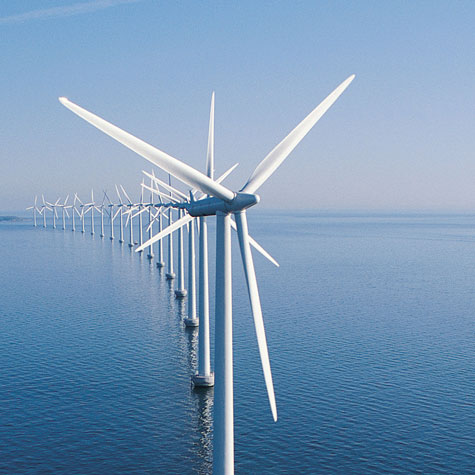 |
With Governor Carcieri’s second and final term coming to an end, it is time to think about the “L” word — legacy.
Critics have plenty they might pin on the departing governor: the disastrous economy of recent years, Carcieri’s opposition to gay marriage in a period of historic progress on the issue, and his failure to reach an accommodation with the Democratic General Assembly and push through key components of his agenda.
The governor, for his part, has highlighted a shrinking state government. And he has tried to turn his fights with the legislature over taxes and spending into a badge of honor.
But the Republican also makes a case one might expect from a Democrat — a case for a green governorship. Administration officials trumpet a regional cap-and-trade compact, expanded open space preservation, and a push for environmentally friendly government buildings.
At the heart of Carcieri’s argument, though, is his high-profile press for a 100-turbine wind farm off the coast of Block Island. And that effort sustained a major blow in recent weeks when the state’s Public Utilities Commission effectively derailed plans for a small, eight-turbine wind farm that was to serve as a precursor to the larger project.
At issue: a contract between Deepwater Wind, the New Jersey company behind the wind farm proposals, and utility National Grid that would have set the price for power emanating from the eight-turbine farm at about three times the cost of power from traditional sources.
The PUC determined that the cost, which would ultimately be passed on to consumers, was not “commercially reasonable.” Environmentalists countered that the commission, whose chairman has suggested that he is among those who “don’t accept climate change,” failed to consider the environmental benefits and energy independence the wind farms promise.
Deepwater CEO William M. Moore issued a statement saying he was “extremely disappointed” in the commission’s decision and warning that the company would have to “reevaluate” its plans for Rhode Island. And with the PUC required to consider plans for the larger wind farm under an even stricter standard, the firm has every reason to consider pulling out of the state altogether.
Carcieri, who has met with the House and Senate leadership in a bid to get the project back on track, issued his own indignant statement after the PUC’s vote, calling it “an extraordinarily short-sighted and narrow-minded decision” that threatened plans for a clean-energy economy in Rhode Island
And the statement spoke to what has always excited Carcieri most about the wind farm initiative: its economic potential. Sure, the governor makes a nod to the green sheen on the project. But he is most animated when he talks of energy price stability and the potential for an offshore wind industry centered in Quonset Point.
Carcieri is a Republican, after all. And his ideological cast has long left environmentalists in the state uneasy. That was never more evident than last month, when he signed onto a letter with 19 other governors, most of them Republicans, asking Congress to stop “harmful” Environmental Protection Agency (EPA) regulation of greenhouse-gas emissions in the interest of keeping down energy prices.
The move incensed environmentalists. Rhode Island, after all, was a party to the landmark Supreme Court case that gave the EPA the authority to regulate greenhouse gas emissions in the first place. And when Carcieri signed onto the letter, the state was finishing work on a settlement with automakers who had sued Rhode Island and a handful of other states over their attempts to regulate tailpipe emissions.
The settlement, reaching completion as the Phoenix went to press, will help clear the way for a national standard on tailpipe regulations. But the deal hinges on the EPA’s power to regulate greenhouse gases — a power Carcieri was seeking to block with his letter to Congress.
Attorney General Patrick C. Lynch, in a letter to the state’s Congressional delegation, attacked Carcieri for undermining a settlement his office had hammered out on the administration’s behalf.
Amy Kempe, a spokeswoman for the governor, says the letter did not undermine the state’s legal position and was simply meant to suggest that Congress, rather than a federal agency, should be making decisions on greenhouse gas regulation. It was, in short, a matter of ideology.
Tricia K. Jedele, director of the Conservation Law Foundation’s Rhode Island office, says Carcieri has been a reluctant environmentalist at best. He was slow to sign onto the regional cap-and-trade initiative, she says, let a key water conservation bill pass into law last year without his signature, and has cut too much of the Department of Environmental Management’s staff.
It is a critique that will endure in green circles. But if Carcieri can get those 100 turbines erected some 15 to 25 miles off the coast of Block Island, it may not be much remembered elsewhere.